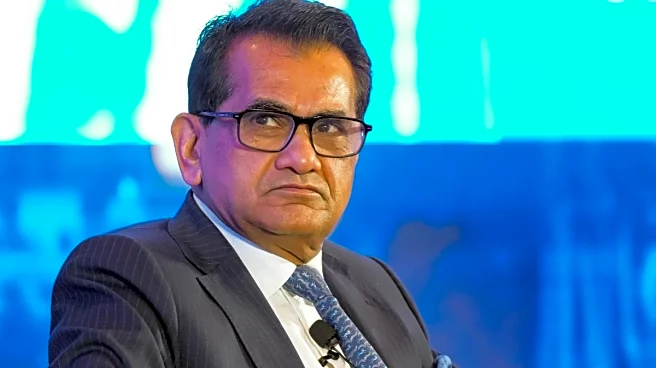Amitabh Kant, India’s ace policymaker and the architect behind landmark initiatives such as Incredible India, Startup India, and Make in India, is now bringing his vision to higher education. As the Chancellor
of NIIT University, the former NITI Aayog CEO and ex-G20 Sherpa aims to foster leadership, innovation, and technology among students.
“The future belongs to those who can think ahead, embrace technology, and create solutions that transform society,” Kant said. In an exclusive interview with News18.com, he shared his insights on nurturing future-ready leaders, the transformative role of AI in education, and how Indian universities can compete globally while fostering research, creativity, and a culture of innovation.
Here are the edited excerpts of the interview:
You’ve led major policy institutions like NITI Aayog and represented India as G20 Sherpa. Now you’re taking on an academic leadership role. How different is leading a university from leading a government think tank?
I started as the District Collector of Kozhikode. I was elected to be the Secretary of Industries, then worked in tourism, commerce and infrastructure, and later became the CEO of NITI Aayog and G20 Sherpa. It has been a very rewarding and rich experience for me. But I wanted to do some academic and intellectual work and therefore I was given the opportunity to be the Chancellor of NIIT University, which is one of India’s finest universities. It is a wonderful campus, it has some bright and brilliant students and a great faculty. They are also working on cutting-edge courses of AI, robotics, drones, and biotechnology. All this makes it the university of the future, and I look forward to fully supporting them in this endeavour.
How do you plan to mentor students and faculty to think like leaders, not just job seekers?
The future belongs to those who can transform the world of tomorrow, and that future will require extensive use of technology for India to progress. My role will be to mentor faculty members and students to ensure they become the finest products of this university. NIIT University should build its image as one of the greatest technology universities, a true university of the future, and that will be my mission.
As you know, artificial intelligence is transforming the education sector worldwide. How do you see AI changing higher education in India, and how can universities use it responsibly to improve learning without losing the human connection?
What was once impossible is now possible through technology. AI allows students to research and write better, but more importantly, it helps them become multidisciplinary, connect the dots, and think ahead. Artificial intelligence makes people more efficient, but real disruption still requires human intelligence. AI will be a powerful tool that enables students to leap forward technologically, in manufacturing, enterprise, services, learning, and even healthcare. It will enhance productivity and efficiency across all sectors.
In the Times Higher Education Rankings, only five Indian universities made it to the top 500. What do you think Indian universities need to do to compete with top global institutions, not just in rankings but in producing meaningful research and original ideas?
You are absolutely right. Indian universities need to do much more research, innovation, and writing, and file more patents. Students must cultivate a culture of innovation and creativity. The challenge for Indian universities is to increase research output and innovative work. That is what will attract the best students and top global companies. Research and innovation are the keys to the future of higher education in India.
What single piece of advice would you give to students who aspire to shape public policy, governance, or education in the coming decades?
My advice is simple, always stay positive and optimistic. Think 30 years ahead of your time and embrace technology. Technology will be the biggest enabler for India’s progress in the coming decades.


/images/ppid_a911dc6a-image-177105042575465447.webp)

/images/ppid_a911dc6a-image-177105033328862095.webp)
/images/ppid_a911dc6a-image-177105037137039801.webp)







/images/ppid_59c68470-image-177105003415990657.webp)

/images/ppid_59c68470-image-177105003432353455.webp)
/images/ppid_a911dc6a-image-177104902795770968.webp)